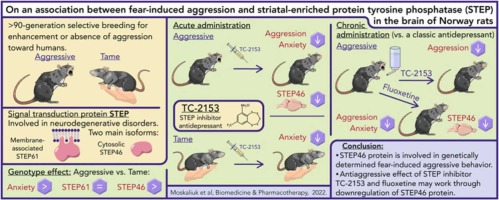В журнале Biomedicine & Pharmacotherapy (IF 6,529) опубликована статья, соавторами которой являются сотрудники Института к.х.н. Хоменко (снс, ЛФАВ), д.х.н., проф. РАН К.П. Волчо (гнс, ЛФАВ) и чл.-корр. РАН, д.х.н., проф. Н.Ф. Салахутдинов (зав. отделом медицинской химии)
On an association between fear-induced aggression and striatal-enriched protein tyrosine phosphatase (STEP) in the brain of Norway rats
Vitalii S. Moskaliuk, Rimma V. Kozhemyakina, Darya V. Bazovkina, Elena Terenina, Tatyana M. Khomenko, Konstantin P. Volcho, Nariman F.Salakhutdinov, Alexander V. Kulikov, Vladimir S. Naumenko,Elizabeth Kulikova
Biomedicine & Pharmacotherapy, Volume 147, March 2022, 112667
doi:10.1016/j.biopha.2022.112667

Abstract
Striatal-enriched protein tyrosine phosphatase (STEP) is a signal transduction protein involved in the pathogenesis of neuropathologies. A STEP inhibitor (TC-2153) has antipsychotic and antidepressant effects. Here, we evaluated the role of STEP in fear-induced aggression using Norway rats selectively bred for 90 generations for either high aggression toward humans (aggressive rats) or its absence (tame rats). We studied the effects of acute administration of TC-2153 on behavior and STEP expression in the brain of these animals and the influence of chronic treatment with TC-2153 on the behavior and STEP expression in aggressive rats in comparison with classic antidepressant fluoxetine, which is known to exert antiaggressive action. Acute TC-2153 administration decreased the aggressive reaction to humans in aggressive rats, while having no impact on the friendly behavior of tame rats. Moreover, in the elevated plus-maze test, the drug had an anxiolytic effect on both aggressive and tame rats. Aggressive rats demonstrated elevated levels of a STEP isoform (STEP46) as compared to tame animals, whereas acute TC-2153 administration significantly reduced STEP46 protein concentration in the brain of aggressive rats. Chronic treatment of aggressive rats with either TC-2153 or fluoxetine attenuated fear-induced aggression. Chronic administration of fluoxetine enhanced the exploratory activity in the elevated plus-maze test and decreased the STEP46 protein level in aggressive rats’ hippocampus, whereas chronic TC-2153 administration did not affect these parameters. Thus, STEP46 can play an important role in the mechanisms of aggression and may mediate antiaggressive effects of TC-2153 and fluoxetine.
Альметрики:


